MPW4Kindness: Mental Health Awareness Week 2020
Welcome to MPW’s campaign for Mental Health Awareness Week 2020, the theme this year being ‘kindness’.
Day 1: Kindness – a strength or a weakness?
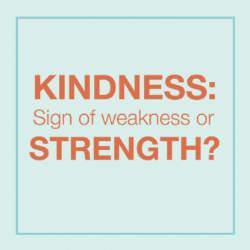
The past several weeks have tested us as individuals, families and communities and we’ve quickly had to adapt to new ways of studying, working and getting on with our lives. Navigating difficult circumstances can be emotionally taxing, contributing to poor mental health or exacerbating existing conditions.
It has, however, been encouraging to see an increased focus on mental wellbeing during this period, with a plethora of support aids, information and sources of guidance being widely shared.
Being kind, in some ways presents an interesting polarity; on the one hand it is viewed as virtuous to bequeath kindness and exhibit a generosity of spirit. It can, however, feel risky to be kind or perceived as kindly, as this could open one to the possibility of being taken advantage of or exploited.
Studies have shown that kindness has a positive impact on mental health for all parties involved in the exchange. Therefore, these demonstrations of care for others can actually be a form of self-care. Far from being a sacrificial giving of self, leading to depletion, true kindness is a sharing of strength which can empower self and others. To quote Kahlil Gibran:
Tenderness and kindness are not signs of weakness and despair but manifestations of strength and resolution.
Check in with us throughout this week (18-22 May 2020) on our website and social media channels for more kindness tips and thoughts.
Day 2: Don’t bottle up your feelings!
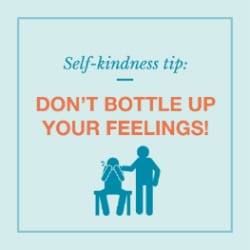 This week we are contemplating not just acts of kindness towards others, but also self-kindness. Being caring, giving etc. to ourselves may feel effortless for some and less comfortable for others. Self-kindness goes beyond just ‘being nice’ to ourselves. It also encompasses cultivating a mindset of self-compassion and supporting ourselves with an internal support system of self-nurture.
This week we are contemplating not just acts of kindness towards others, but also self-kindness. Being caring, giving etc. to ourselves may feel effortless for some and less comfortable for others. Self-kindness goes beyond just ‘being nice’ to ourselves. It also encompasses cultivating a mindset of self-compassion and supporting ourselves with an internal support system of self-nurture.
Self-kindness requires tending to the maintenance of our feelings and emotions. It can sometimes feel easier to distract ourselves from how we are really feeling inside. Holding in worries and difficult emotions can lead to experiencing overwhelm, anxiety and even certain physical symptoms. Try not to bottle things up – express yourself! This could be by talking to a trusted friend or family member, or a therapist.
If it feels too hard to talk or is not practical to do so, expressing can be done through other means, such as writing, art, singing or movement. There is no one size fits all for how we as individuals work through our feelings.
Day 3: Volunteer to help others
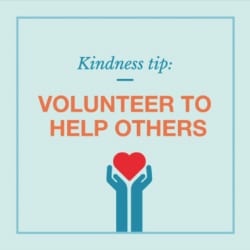 Acts of charity have been a major feature during the period of lock-down. Whether helping a neighbour with their weekly shop or getting involved with a larger organisation to aid in providing goods and assistance, voluntary service has been a lifeline to so many who faced potential crisis.
Acts of charity have been a major feature during the period of lock-down. Whether helping a neighbour with their weekly shop or getting involved with a larger organisation to aid in providing goods and assistance, voluntary service has been a lifeline to so many who faced potential crisis.
Over half a million people responded to the call for NHS volunteers during the pandemic, by far exceeding the target of 250,000. The medical director of NHS England, Stephen Powis, described this as “outbreaks of altruism”.
The Mental Health Foundation informs us of “the health benefits of altruism”:
1. Helping others feels good. There is some evidence to suggest that when you help others, it can promote physiological changes in the brain linked with happiness. Helping others can also improve our support networks and encourage us to be more active. This in turn can improve our self-esteem.
2. It creates a sense of belonging and reduces isolation. Volunteering and helping others can also help us feel a sense of belonging, make new friends and connect with our community. Face-to-face activities such as volunteering at a food bank can help reduce loneliness and isolation.
3. It helps keep things in perspective. Many people don’t realise the impact that a different perspective can have on their outlook on life. Helping others, especially those who are less fortunate than yourself, can help to put things into perspective and make you feel more positive. There is some evidence that being aware of your own acts of kindness, as well as the things you are grateful for, can increase feelings of happiness, optimism, and satisfaction. Doing good may help you to have a more positive outlook about your own circumstances.
4. It helps make the world a happier place – it’s contagious! Acts of kindness have the potential to make the world a happier place. An act of kindness can improve feelings of confidence, being in control, happiness and optimism. It may also encourage others to repeat the good deed that they’ve experienced themselves – contributing to a more positive community.
5. The more you do for others, the more you do for yourself. The benefits of helping others can last long after the act itself, both for you and them.
It is clear that volunteering is both an act of kindness towards others and also self-kindness. One of our A level students, Jonathan, has written an article which explores this theme further – read Jonathan’s article here.
Day 4: Get outdoors!
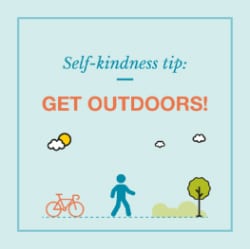 Being restricted to the confines of our homes appears to have renewed our appreciation of the great outdoors!
Being restricted to the confines of our homes appears to have renewed our appreciation of the great outdoors!
It is commonly claimed that going for a walk or a run helps to clear the mind and there is plenty of evidence to support this, with there being a proven link between exercise and improved mental wellbeing. Furthermore, there is something about being outdoors; feeling the heat of the sun, or the chill of a breeze and noticing other people as they go about their day (from a safe 2 metre distance of course!). There is a sense of connectedness that can be gained from being outdoors, be that a connection with others, nature, or both.
Those with mental health conditions may at times find going outdoors quite daunting and indeed, the home can represent a safe space, with the outside world seeming a scary place. With this week’s theme in mind, it’s about being kind to yourself and taking small steps if you need to: perhaps start with sitting or standing outside your front door or balcony. If possible, a member of your household could support you at the beginning. Gradually this can be built on by taking a very short walk to the end of your street, then progressively increasing as confidence grows.
As the limitations imposed by the pandemic are easing, we can begin again to venture further afield and perhaps it is the sense of being able to expand and having freedom to explore, that may cause our spirits to lift along with the restrictions. So whether it is with baby-steps or joyous leaps and bounds, getting outdoors really can do you the world of good!
Day 5: Actively listen
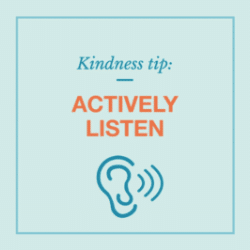 It’s the final day of MPW’s Mental Health Awareness Week campaign!
It’s the final day of MPW’s Mental Health Awareness Week campaign!
Our last kindness tip is to actively listen. To truly listen attentively to someone in distress is one of the most supportive acts of kindness you can give. If someone needs a shoulder to cry on or just someone to talk to, try to just listen to them. Resist the urge to jump in with your own anecdotes. Resist the urge to offer advice. Resist the urge to try to solve their problems. Just actively listen and be there for them. They’ll appreciate it.
Active listening is a skill and is not typically used in everyday conversation, as it requires paying more attention to the other person, in an effort to genuinely empathise with them. Patience is also needed, to stay focused on what the other person is saying, whilst they express at their own pace.
Throughout this week, we have shared ideas on being kind to self and others to promote good mental health and best support ourselves and each other through challenging times. We hope you have enjoyed it!

